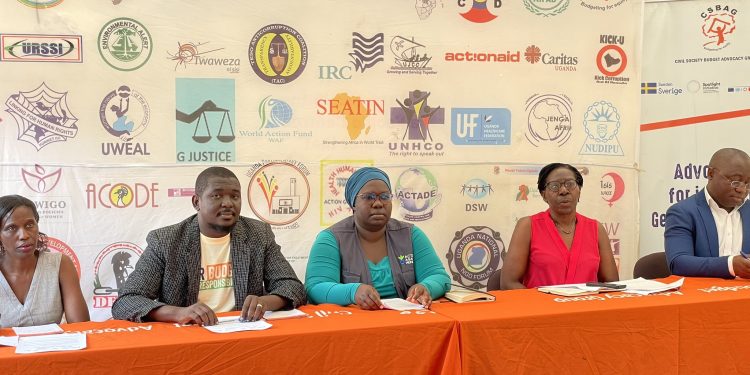Civil society organizations under their coalition, Civil Society Budget Advocacy Group (CSBAG), have called upon the government to ensure that the National Budget Framework Paper (NBFP) is geared towards accelerating economic recovery and social transformation of Ugandans.
The government through the Ministry of Finance tabled the NBFP for the Financial Year 2023/24, in December 2022 in accordance with section 9 (3) of the Public Finance Management Act, 2015 (Amended).
In FY 2023/24, the resource envelope is projected to increase from UGX 48 trillion in FY 2022/23 to UGx 49.9 trillion.
The Human Capital Development programme is projected to take the largest share amounting to UGX 9,005.61 billion (18.0%), followed by Governance and Security programme at UGX 6,824.89 billion (13.7%), Integrated Transport Infrastructure & Services programme is projected to be allocated UGX 4,656.49 billion (9.3%), Agro Industrialization will receive UGX 1,499.33 (3%).
According to Patrick Rubangakane, the Budget Policy Specialist CSBAG, as of June 2021, the share of public debt stock to the Gross Domestic Product (GDP) had increased from 46.90 percent (US$ 19.54 billion) to 48.4 percent (US$ 20.99 billion) in June 2022.
He says this is partly driven by Uganda’s focus to borrow on non-concessional terms which ultimately increases the cost of borrowing and high cost of debt servicing and reduces discretionary spending.
He called upon the Government to cap borrowing non-concessional loans and ensure prudent debt utilization. For example, only financial and economically viable public investment projects should be approved for financing.
He also noted that the high budget cuts affecting service delivery for the vulnerable are of great concern which is likely to affect the implementation of critical interventions for vulnerable groups.
Rubangakene called upon the government to reconsider the budget cuts with a focus on the provision of service delivery to vulnerable groups as it targets economic recovery.
Mariam Akiror, the Advocacy and Communication Coordinator at Action Against Hunger, said they are concerned by the proposed budget cuts to the entities within programs that are critical to facilitate food production and productivity.
She outlined entities like the Uganda National Bureau of Standards budget which is projected to reduce from UGX 1,110 billion in FY2022/23 to UGX 940 million in FY2023/24.
The local government budget is projected to reduce from UGX 245.49 billion in FY2022/23 to UGX 120.73 billion in FY2023/24. The storage, agro-processing and value addition subprogram’s budget is expected to reduce from UGX 62.120 billion in FY2022/23 to UGX 25.812 billion in FY2023/24.
Akiror says to have a food-secure population government must do direct strategic investments in water for production, agricultural extension services, post-harvest handling, improving standards and access to affordable credit by smallholder farmers.
She adds that it also needs to finalize the National Irrigation Master Plan, and the National Agriculture Extension Strategy (NAES), to support interventions geared towards securing land ownership rights for women who play a key role in Uganda’s agricultural productivity and food production.
“CSOs commend the Government on the measures taken to revamp the economy that has resulted in the growth of private sector credit by 0.4% between November and December 2022, trade balance improvements and retaining the stability of the Uganda Shilling relatively against the dollar during the three months to November 2022 which appreciated by 1.6.2,” Rubangakene said











